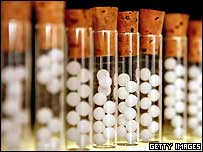
Some favour homeopathic medicine ahead of mainstream treatments
|
A range of complementary therapies such as homeopathy and aromatherapy are to be regulated by a new body.
The Natural HealthCare Council is due to begin work in April. Currently, anyone can offer a complementary medicine service.
The watchdog will set standards and have the power to strike off those deemed incompetent, although membership of the body will be voluntary.
The Patients Association said the move to regulate was "welcome and overdue".
A spokeswoman for the charity, which provides patients with a forum to share experiences of healthcare, said the fact that anyone can provide complementary medicines and treatment had been a "a source of concern".
"Patients will feel more secure as a result of this new body and they will know who to contact if they are unhappy with their treatment," she said.
Cancer treatment
A lack of regulation has prompted calls for a body to monitor conduct and standards among complementary health practitioners.
Britons spend around �130m a year on treatments like aromatherapy and reflexology.
Those who practice the therapies will be able to register with the new governing body which is being set up by the Prince of Wales's Foundation for Integrated Health.
Spokesman Ian Cambray Smith explained that regulation was necessary to provide "public confidence".
He said: "One of the problems, from the point of view of the public, there are many different types of professional body, there are many different sets of initials that practitioners have after their names and nobody's quite sure what they all mean.
"By bringing things together in this way, it can give the public confidence. "
He added that if complementary healthcare practitioners must be prepared to offer the same standards and quality if they want to be considered alongside orthodox healthcare.
'Public safety'
The Department of Health commissioned the Prince of Wales Foundation to set up the new regulator.
A spokesman said: "Currently, there is no statutory regulatory system in the UK governing the practice of other complementary therapies such as homoeopathy.
"The Department of Health have commissioned the Prince of Wales Foundation for Integrated Health (FiH) to develop voluntary self-regulation amongst a range of currently unregulated professions.
"To ensure public safety, the Department of Health encourages all CAM practitioners to register with a reputable voluntary regulatory body."
The Natural HealthCare Council will only register practitioners who have a recognised professional qualification, are insured and have signed up to the code of conduct.
A spokesman for Penny Brohn Cancer Care, formerly the Bristol Cancer Help Centre, said: "With 280,000 diagnoses of cancer each year, more people than ever before are seeking therapies which complement their cancer treatment.
"We hope the new Council will highlight best practice, encourage research and build the evidence base. We also welcome any move to raise professional standards."

~RS~q~RS~~RS~z~RS~14~RS~)
Bookmark with:
What are these?